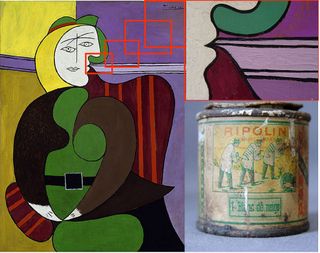How I write a story
 |
Image: © Art Institute of Chicago, Gift of Mr. and Mrs. Daniel Saidenberg, © Estate of Pablo Picasso
|
Tradition for centuries was that a trusted student was given the formulas to his master's paints so he could recreate them. These were heavily guarded secrets to help foil counterfeiters but Pablo Picasso's color palette was quite different from his teachers'. They were unique to the world of art and became his signature. It wasn't until physicists at the Argonne National Laboratory in Lemont, Ill. inspected one of his paintings with their hard x-ray nanoprobe did they find the answer: he had used common house paints most likely purchased from a local hardware store.
Did the use of these common paints somehow cheapen his work? Of course not. But why did he do this? He used the paints that worked for him and took advantage of the technology of his time when common house paints came in great and bold varieties.
When I was growing up I envisioned writers slaving away over a typewriter and later in life a word processor carefully editing each word with a dictionary to one side and a thesaurus on the other. Even later when those "flat file databases" or books were replaced with a Google search it was still pretty much the same: type, read, edit, repeat. Anything else was cheating.
Early in my photojournalism career I was taught a trick from my editor. While one should never edit their own work sometimes we must and he taught me in those times to take my written words, turn the paper upside down and read them. The idea was that the brain would process those words differently than just reading them the usual way and I could better catch my mistakes. It was a good lesson that has always stayed with me.
In 2018 I decided to write my first novelle with a length of about 20,000 words; something that I had never attempted. While I started that work the traditional way of type, read, edit, repeat I quickly found a better path.
I believe one should use the best tools for a job. For me Google Docs was my word processor of choice because it was always nearby, always backed up and always worked. It had a couple of features that I quickly embraced: voice typing, text-to-speech and grammar checking.
While I'm quite content to type away for hours sometimes the words come faster than I can type and found voice typing to be the solution to my slower fingers. Instead of losing my train of thought I could simply dictate my words at an amazing speed and edit as needed. My writing always needs lots of editing.
The second is text-to-speech. While turning my laptop upside-down could've been an option I found that hearing my words allowed me to process them in a different light than just reading them. This makes sense as visual and audible stimuli are processed in different parts of the brain. It allowed me to "see" my words differently by hearing them instead of just reading them.
When writing complex works my set-up is simple: two Chromebooks side-by-side where I will type and speak to one and use the second to handle the text-to-speech work. With the same document open on both machines almost as fast as I can type on one the words appear on the other. After I write a paragraph I'll select the same on the second laptop, have it read out loud and edit it on the first one. Repeat as needed and it almost always is. In short order I can hear that paragraph over and over until it not only reads well but sounds well.
Grammar checking is pretty self explanatory. While years of writing and having various grammar guides next to me no one is perfect. We all make mistakes and Google Docs does an excellent job of catching them.
With these tools I was able to record a stream of consciousness and set those thoughts to a more permanent form with little interruption. I would type and/or speak each paragraph, listen, edit, repeat until I was happy. After a few paragraphs I'd select those paragraphs and do the same. When a chapter was complete I'd select the entire chapter, listen and edit along the way until I could listen to the entire chapter in its entirety without interruption. The final step was to listen to the entire novel twice without interruption. Only then was I done.
The final result was my first novel "The Beauty of Aqua" which is an exploration of alienation and depression in part caused by neoliberalism from both Western and Eastern perspectives. While over 80,000 words in its final form before editing it totaled about 120,000. It is part of a four novel series that also explores attachment, reflections in one's middle years and finally death.
 |
| Manuscript of "On the road" by Jack Kerouac. image: wikicommons |
What I create with my written words is something unique. I make no qualms about it: my creative writing is different from others. Most rules I follow with a steadfast resolve and other rules I break with the same resolve. When Jack Kerouac wrote "On the Road" he didn't use traditional sheets of paper but rolls of printing paper he could purchase for a lower cost. While more economical it also allowed him to type for longer stretches than his more traditional peers. Did this affect his work? I have to believe so just like how my unique process affects mine. Like Picasso is the use of technology lowering the value of my creative work? No. Technology is a tool and the words I write still come from me just like Picasso's art came from his hand.
While you're more than welcome to use my methods I would encourage you to also find what best works for you so you too can best transform your most inner thoughts into the words read by all.




